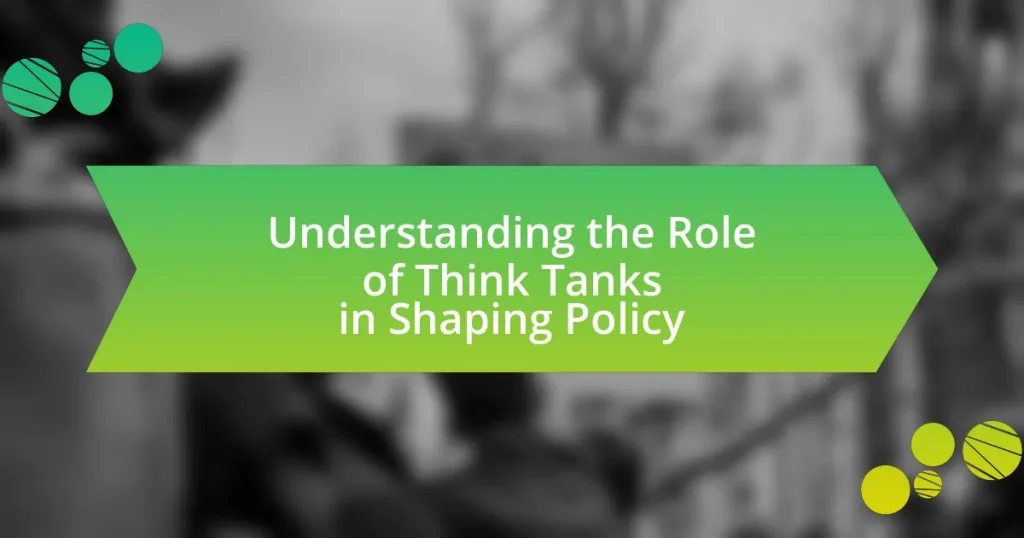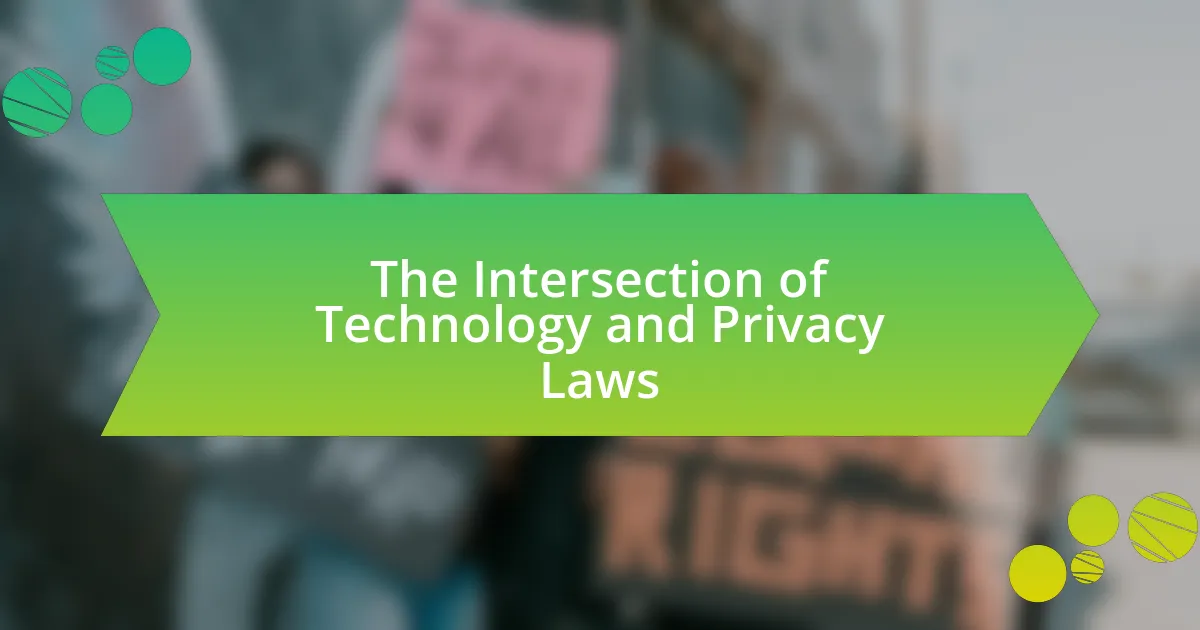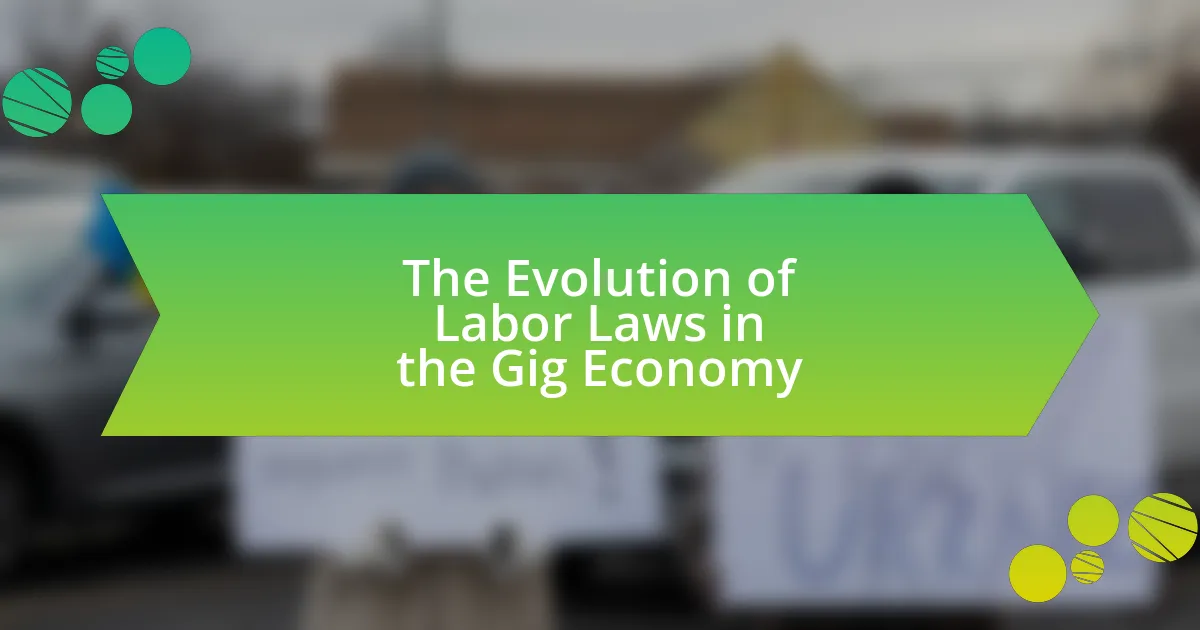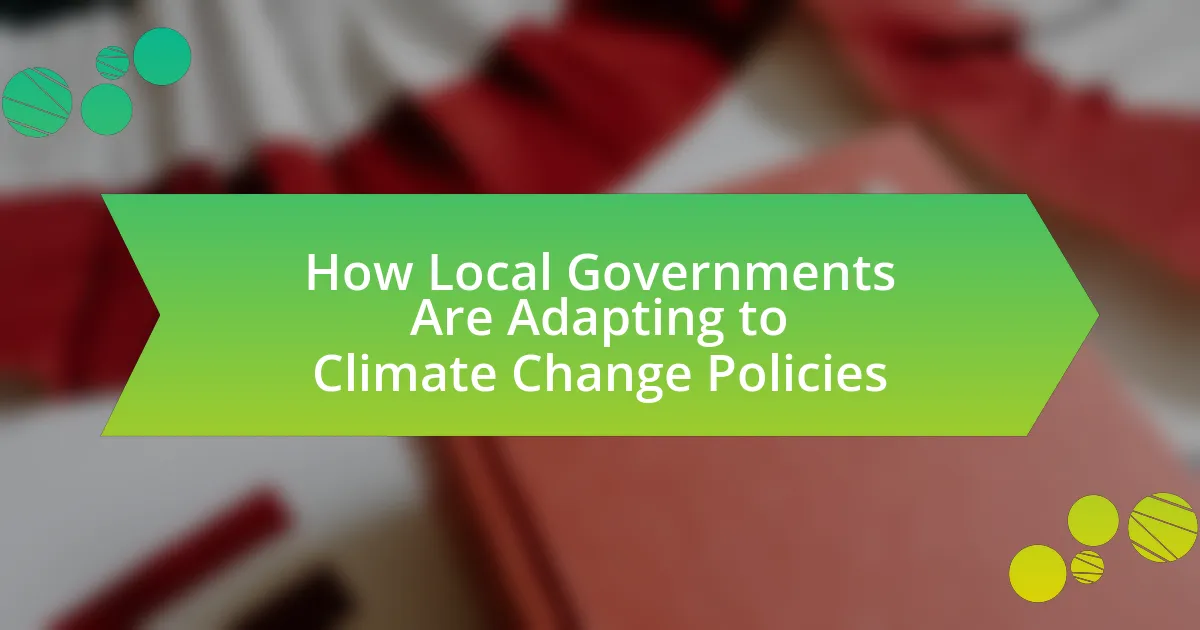Think tanks are research organizations that analyze and develop policy ideas to influence decision-making in government and other sectors. This article explores the purpose of think tanks in policy making, detailing how they provide evidence-based research, expert analysis, and innovative solutions to complex issues. It examines their methodologies, types, and historical context, highlighting their evolution and the challenges they face today. Additionally, the article discusses how think tanks engage with policymakers, collaborate with various entities, and the impact of globalization on their functions, ultimately emphasizing their critical role in shaping public policy.
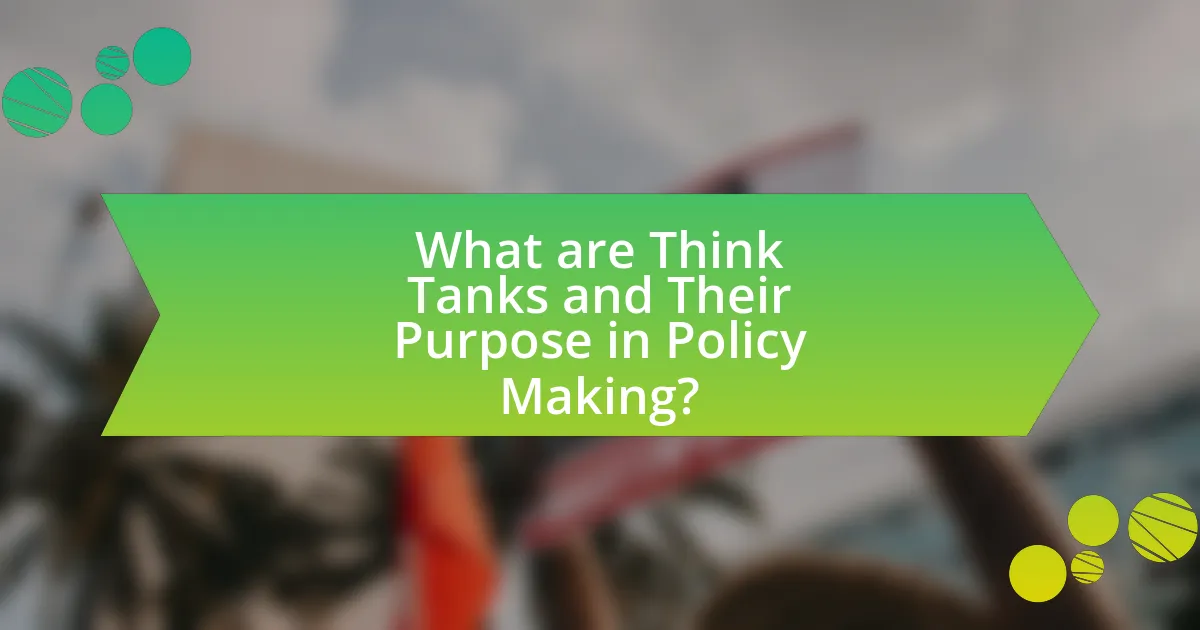
What are Think Tanks and Their Purpose in Policy Making?
Think tanks are research organizations that analyze and develop policy ideas to influence decision-making in government and other sectors. Their primary purpose in policy making is to provide evidence-based research, expert analysis, and innovative solutions to complex social, economic, and political issues. For instance, the Brookings Institution, a prominent think tank, has contributed to policy discussions on economic reform and public health by publishing studies that inform lawmakers and the public. This role is critical as think tanks often bridge the gap between academic research and practical policy implementation, ensuring that decisions are grounded in rigorous analysis and data.
How do Think Tanks influence public policy?
Think tanks influence public policy by conducting research, providing expert analysis, and advocating for specific policy solutions. They produce reports, policy briefs, and recommendations that inform lawmakers and the public, thereby shaping the legislative agenda. For instance, the Brookings Institution and the Heritage Foundation have significantly impacted U.S. policy debates through their research on economic and social issues, respectively. Their findings often serve as a foundation for policy proposals and can sway public opinion, demonstrating their role as key players in the policy-making process.
What methodologies do Think Tanks use to shape policy?
Think tanks use a variety of methodologies to shape policy, including research and analysis, advocacy, and stakeholder engagement. Research and analysis involve conducting empirical studies, data collection, and policy evaluation to inform decision-makers. Advocacy methodologies include lobbying efforts, public campaigns, and strategic communication to influence public opinion and legislative processes. Stakeholder engagement methodologies involve collaboration with government officials, private sector leaders, and civil society to ensure diverse perspectives are considered in policy formulation. These methodologies are supported by evidence from numerous studies, such as the 2020 report by the Brookings Institution, which highlights the effectiveness of think tanks in providing data-driven insights that lead to informed policy decisions.
How do Think Tanks engage with policymakers?
Think tanks engage with policymakers primarily through research dissemination, policy recommendations, and direct consultations. They produce in-depth studies and reports that analyze complex issues, providing evidence-based insights that inform decision-making processes. For example, the Brookings Institution regularly publishes policy briefs that outline actionable recommendations for government officials. Additionally, think tanks often host events, such as workshops and seminars, where policymakers can interact with experts and discuss relevant topics. This direct engagement fosters relationships and facilitates the exchange of ideas, ultimately influencing policy development.
What types of Think Tanks exist?
Think tanks can be categorized into several types based on their focus and funding sources. The primary types include independent think tanks, which operate without government or corporate funding and prioritize research integrity; university-affiliated think tanks, which are connected to academic institutions and often focus on scholarly research; and government think tanks, which are established by governmental bodies to inform policy decisions. Additionally, there are corporate think tanks that are funded by private companies to influence policy in favor of business interests, and advocacy think tanks that aim to promote specific ideological perspectives or policy agendas. Each type plays a distinct role in shaping public policy and discourse.
What distinguishes independent Think Tanks from those affiliated with political parties?
Independent think tanks are characterized by their lack of affiliation with political parties, which allows them to pursue research and policy recommendations without partisan bias. This independence enables them to address a broader range of issues and engage with diverse perspectives, fostering a more objective analysis of public policy. In contrast, think tanks affiliated with political parties often align their research and advocacy with the specific ideologies and agendas of those parties, which can limit their objectivity and scope. For example, a study by the Brookings Institution highlights that independent think tanks are more likely to produce non-partisan research, while party-affiliated think tanks may prioritize the interests of their political sponsors.
How do academic Think Tanks differ from advocacy Think Tanks?
Academic think tanks primarily focus on research and the generation of knowledge, while advocacy think tanks aim to influence public policy and opinion. Academic think tanks, such as the Brookings Institution, emphasize rigorous analysis, empirical studies, and theoretical frameworks to contribute to scholarly discourse. In contrast, advocacy think tanks, like the Heritage Foundation, prioritize promoting specific policy agendas and mobilizing public support for particular issues. This distinction is evident in their funding sources, methodologies, and outputs; academic think tanks often rely on grants and academic partnerships, whereas advocacy think tanks may depend on donations from individuals or organizations aligned with their causes.
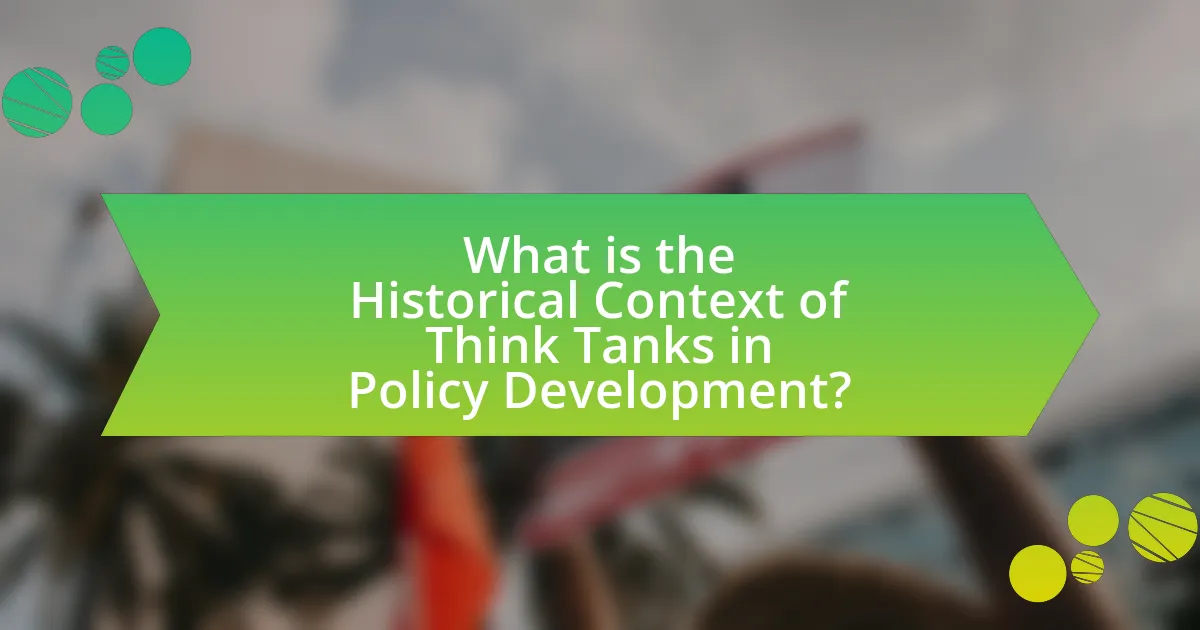
What is the Historical Context of Think Tanks in Policy Development?
Think tanks emerged in the early 20th century as organizations dedicated to research and analysis aimed at influencing public policy. The establishment of the Brookings Institution in 1916 marked a significant milestone, as it was one of the first formal think tanks in the United States, focusing on economic and social policy. Throughout the 20th century, especially during the Cold War, think tanks proliferated, with institutions like the Rand Corporation and the Heritage Foundation playing pivotal roles in shaping defense and domestic policies. Their influence grew as they provided expert analysis and recommendations to policymakers, reflecting a shift towards evidence-based decision-making in governance. This historical context illustrates how think tanks have become integral to the policy development process, bridging the gap between academic research and practical governance.
How have Think Tanks evolved over time?
Think tanks have evolved from informal groups of intellectuals in the early 20th century to formalized organizations that influence public policy globally. Initially, think tanks emerged in the United States and Europe as research institutions focused on specific issues, such as defense and economics, with the Brookings Institution founded in 1916 as one of the first. Over time, their roles expanded to include advocacy, providing policy recommendations, and engaging in public discourse, particularly during the Cold War when they became crucial in shaping foreign policy. By the late 20th century, the rise of globalization and technology further transformed think tanks, leading to increased collaboration across borders and the establishment of numerous specialized organizations addressing a wide array of issues, from climate change to social justice. Today, think tanks are integral to the policy-making process, often funded by governments, private foundations, and corporations, reflecting a diverse range of perspectives and interests.
What key events have shaped the role of Think Tanks in policy making?
Key events that have shaped the role of Think Tanks in policy making include the establishment of the Brookings Institution in 1916, which set a precedent for research-driven policy analysis, and the rise of the RAND Corporation during the Cold War, which emphasized the importance of scientific research in defense policy. The 1980s saw the emergence of conservative think tanks like the Heritage Foundation, which influenced U.S. policy through advocacy and research. Additionally, the increasing globalization of policy issues in the 1990s led to the proliferation of international think tanks, such as the Carnegie Endowment for International Peace, which expanded the scope of policy analysis beyond national borders. These events collectively illustrate how Think Tanks have evolved into critical players in shaping public policy through research, advocacy, and strategic influence.
How has globalization impacted the function of Think Tanks?
Globalization has significantly expanded the function of think tanks by increasing their role in international policy discourse and collaboration. As global interconnectedness has grown, think tanks have adapted by focusing on transnational issues such as climate change, trade, and security, necessitating a broader perspective that transcends national borders. For instance, the rise of global challenges has led think tanks to engage in cross-border partnerships and networks, enhancing their ability to influence policy at multiple levels. This shift is evidenced by the increasing number of collaborative reports and joint initiatives among think tanks from different countries, reflecting a shared commitment to addressing complex global issues.
What are the challenges faced by Think Tanks today?
Think tanks today face several significant challenges, including funding instability, political polarization, and the rapid pace of information dissemination. Funding instability arises as many think tanks rely on donations and grants, which can fluctuate based on economic conditions and donor priorities. Political polarization complicates their ability to present unbiased research, as stakeholders may question the objectivity of their findings based on perceived political affiliations. Additionally, the rapid pace of information dissemination through digital platforms makes it difficult for think tanks to maintain relevance and influence in policy discussions, as competing narratives can quickly overshadow their research. These challenges hinder their effectiveness in shaping informed policy decisions.
How do funding sources affect the independence of Think Tanks?
Funding sources significantly affect the independence of think tanks by influencing their research agendas and policy recommendations. When think tanks rely heavily on specific donors, such as corporations or government entities, their outputs may align more closely with the interests of those funders, potentially compromising objectivity. For instance, a study by the Brookings Institution found that think tanks funded by corporate interests often produce research that favors those industries, thereby limiting their ability to provide unbiased analysis. This dependency can lead to a perception of bias among stakeholders and the public, ultimately affecting the credibility and effectiveness of the think tanks in shaping policy.
What role does public perception play in the effectiveness of Think Tanks?
Public perception significantly influences the effectiveness of think tanks by shaping their credibility and impact on policy discussions. When the public views a think tank as reputable and trustworthy, its research and recommendations are more likely to be considered by policymakers and the media. For instance, a 2020 study by the Brookings Institution found that think tanks with higher public trust received more media coverage and had greater influence on legislative outcomes. This correlation demonstrates that positive public perception enhances a think tank’s ability to affect policy decisions and engage stakeholders effectively.

How do Think Tanks Collaborate with Other Entities?
Think tanks collaborate with other entities through partnerships, research initiatives, and policy advocacy efforts. These collaborations often involve academic institutions, government agencies, non-profit organizations, and private sector companies, allowing think tanks to leverage diverse expertise and resources. For instance, the Brookings Institution frequently partners with universities to conduct joint research projects, enhancing the credibility and reach of their findings. Additionally, think tanks like the RAND Corporation engage with government entities to provide data-driven policy recommendations, demonstrating their role in shaping public policy through collaborative efforts.
What partnerships do Think Tanks form to enhance their impact?
Think tanks form partnerships with various stakeholders, including government agencies, academic institutions, non-profit organizations, and private sector entities, to enhance their impact. These collaborations allow think tanks to leverage diverse expertise, share resources, and amplify their research findings. For instance, partnerships with universities facilitate access to academic research and data, while collaborations with government bodies can lead to the implementation of policy recommendations. Additionally, alliances with non-profits and businesses can help think tanks reach broader audiences and influence public discourse. Such strategic partnerships are essential for think tanks to effectively contribute to policy development and societal change.
How do Think Tanks collaborate with government agencies?
Think tanks collaborate with government agencies primarily through research partnerships, policy analysis, and advisory roles. These organizations provide evidence-based insights and recommendations that help shape public policy decisions. For instance, think tanks often conduct studies on economic, social, and environmental issues, which are then presented to government officials to inform legislative agendas. A notable example is the Brookings Institution, which has worked with various government entities to analyze the impacts of policy changes and propose actionable solutions. This collaboration enhances the decision-making process by integrating expert knowledge into governmental frameworks.
What role do Think Tanks play in international policy discussions?
Think tanks play a crucial role in international policy discussions by providing research, analysis, and recommendations that influence decision-makers. They serve as platforms for expert dialogue, facilitating the exchange of ideas among policymakers, academics, and practitioners. For instance, the Brookings Institution and the Carnegie Endowment for International Peace have significantly shaped U.S. foreign policy through their comprehensive studies and reports on global issues. Their contributions often inform legislative debates and diplomatic strategies, demonstrating their impact on shaping international relations and policy frameworks.
How can individuals and organizations engage with Think Tanks?
Individuals and organizations can engage with think tanks by participating in their events, collaborating on research projects, and providing funding or resources. Think tanks often host public forums, workshops, and seminars that allow individuals and organizations to contribute to discussions on policy issues. Additionally, partnerships can be formed for joint research initiatives, enabling stakeholders to leverage think tank expertise for specific projects. Financial support from organizations can also facilitate think tank operations, allowing them to expand their research capabilities and outreach efforts. Engaging with think tanks in these ways fosters a collaborative environment that enhances policy development and implementation.
What opportunities exist for collaboration with Think Tanks?
Collaboration with think tanks offers opportunities such as joint research projects, policy analysis, and public engagement initiatives. Think tanks often seek partnerships with academic institutions, government agencies, and non-profit organizations to leverage diverse expertise and resources. For instance, the Brookings Institution collaborates with universities to conduct in-depth studies on economic policy, enhancing the quality and reach of their findings. Additionally, think tanks may engage in co-hosting events or workshops, which facilitate knowledge sharing and networking among stakeholders. These collaborative efforts can lead to more informed policy-making and greater societal impact.
How can one effectively utilize Think Tank research in advocacy efforts?
One can effectively utilize Think Tank research in advocacy efforts by integrating data-driven insights into policy proposals and public messaging. Think Tanks often produce rigorous analyses and reports that provide evidence-based recommendations, which can enhance the credibility of advocacy campaigns. For instance, the Brookings Institution’s research on economic policy has been used by various advocacy groups to support arguments for specific legislative changes, demonstrating how empirical data can influence decision-makers. By leveraging such research, advocates can align their strategies with proven outcomes, thereby increasing the likelihood of achieving their policy goals.
What best practices should Think Tanks follow to maximize their influence?
Think tanks should prioritize strategic communication, collaboration with policymakers, and evidence-based research to maximize their influence. Strategic communication involves crafting clear, compelling messages that resonate with target audiences, ensuring that research findings are accessible and actionable. Collaboration with policymakers fosters relationships that can lead to the integration of think tank insights into legislative processes, enhancing the relevance of their work. Evidence-based research, supported by data and case studies, strengthens credibility and demonstrates the practical implications of their recommendations, making it more likely that policymakers will adopt their proposals. For instance, a study by the Brookings Institution found that think tanks that effectively communicate their research and engage with stakeholders are more likely to influence public policy outcomes.
How can Think Tanks ensure their research is accessible and impactful?
Think tanks can ensure their research is accessible and impactful by employing clear communication strategies, utilizing diverse dissemination channels, and engaging with stakeholders. Clear communication involves using plain language and visual aids to make complex ideas understandable, which enhances public engagement. Utilizing diverse dissemination channels, such as social media, podcasts, and webinars, allows think tanks to reach broader audiences, increasing the likelihood of their research influencing policy decisions. Engaging with stakeholders, including policymakers, community leaders, and the public, fosters collaboration and feedback, ensuring that research addresses real-world issues and resonates with those it aims to inform. For instance, the Brookings Institution has effectively used these strategies to translate research findings into actionable policy recommendations, demonstrating the importance of accessibility and impact in think tank research.
What strategies can Think Tanks employ to maintain credibility and trust?
Think tanks can maintain credibility and trust by ensuring transparency in their funding sources and research methodologies. Transparency allows stakeholders to assess potential biases and conflicts of interest, which is crucial for establishing trust. For instance, the Brookings Institution publicly discloses its funding sources, which enhances its credibility among policymakers and the public. Additionally, employing rigorous peer review processes for research outputs ensures that the information disseminated is accurate and reliable, further solidifying the think tank’s reputation. The RAND Corporation exemplifies this by subjecting its studies to external review, thereby reinforcing the integrity of its findings.
